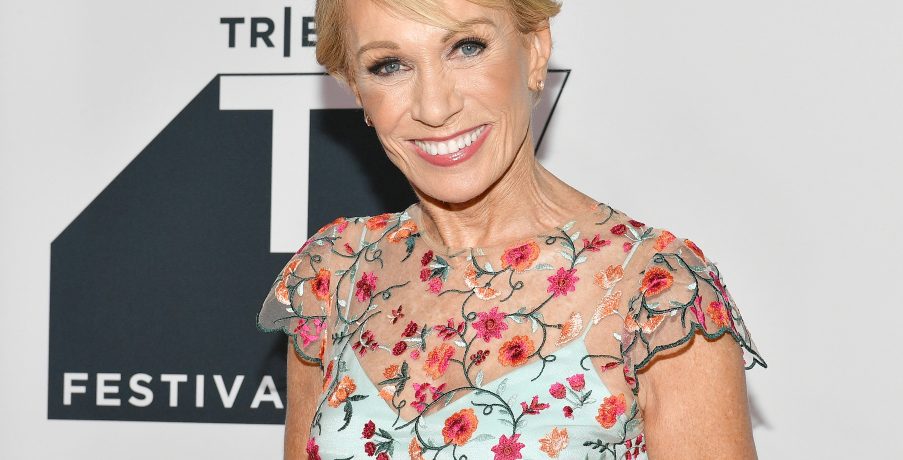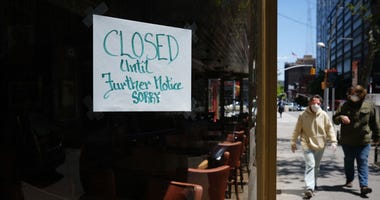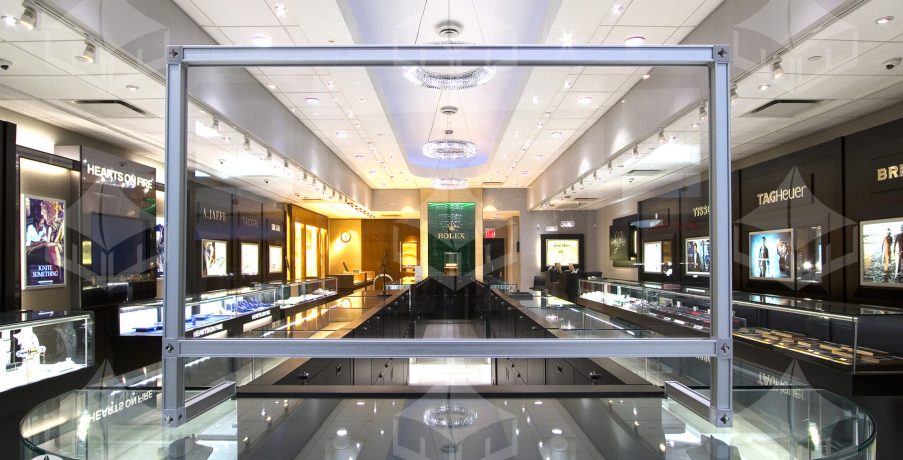
-
Barbara Corcoran Told Her ‘Shark Tank’ Companies To Reinvent To Survive
In Best Of, Entertainment, Featured, Guest, Interview, Latest, News Stories, The World, Top News, videosPost Views: 749By Neil A. Carousso
NEW YORK(WCBS 880) — Real estate mogul Barbara Corcoran says 80 percent of the businesses she has invested in on “Shark Tank” will not survive the economic crisis caused by the coronavirus pandemic.
“The minute this problem started, I said, ‘Sit down and make a list of where every piece of your business comes from, and then, make, right next to it, a list of how you can replace it cause it ain’t going to be there anymore,'” Corcoran told Joe Connolly and Neil A. Carousso of her conversations with the owners of the roughly 80 businesses she bought stake in on the hit ABC reality television program.
Corcoran said on the WCBS Small Business Spotlight, sponsored by BNB Bank, that only a few owners took her seriously when she told them to incorporate a tight team of workers into making decisions on reinventing themselves. Those that did “hit the floor running.”
She said business owners who are persistent and tenacious in their approach are the “warriors” who will survive the recession. She also emphasized communication with customers while working to actively sell current and new products and services.
“I’ve never seen a new business survive if it’s not led by a salesman,” Corcoran said, adding, “If you can’t sell your way out of a pickle, you don’t have a chance.”
She said if an entrepreneur can demonstrate he or she is a master of selling themselves and their business on “Shark Tank,” she’ll “buy anything.”
But, Barbara explained that getting on the show is not a true test of success even though it’s an arduous vetting process.
“When I’m in business with someone three months, maybe four months the most, it’s when the crap hits the fan, what do they do about it? The minute they start blaming somebody else, I know they’re a victim, they’re never going to make it,” she said.
On the flip side, Corcoran told Connolly and Carousso that those owners who take responsibility and actively look for solutions, are the successful business leaders with whom she is making profits.
She also told WCBS 880 that the model for a successful entrepreneur is their track record as a person. Overcoming failure and obstacles in life is an indication to Corcoran that she should invest in the person’s business.
“When I can spot somebody who’s been injured with something to prove, they get a burn in their chest that’s going to make them succeed if they’re hard workers,” she remarked. “I’m looking for that hustler.”
Meanwhile, with tens of millions of Americans unemployed amid the COVID-19 outbreak and business shutdowns, Corcoran is seeing a sizable shift in the real estate market with people fleeing the City for suburbs in New Jersey and Connecticut. The Corcoran Group owner says employers see their employees working efficiently at home and will cut unnecessary brick and mortar costs. U.S. office vacancy will rise from 16.8 percent to 19.4 percent by year’s end, according to Moody’s Analytics REIS estimates. Corcoran sees that as good news for tenants who have taken negotiating power from landlords.
https://www.facebook.com/NeilACarousso/videos/705347700029920/
“The value per foot has got to drop substantially for the landlord to attract tenants and he’s going to have to become a salesman,” she said.
But, Barbara is bullish on the Big Apple.
“I have such confidence in the City. I have no doubt that the City will chug like it always does. We’re just going to hesitate and push forward,” Corcoran, who has lived in New York since she was 22 years old, said, punctuating, “I think it may recover faster than we think.”
She remembers seeing how the country rallied around New York City after the September 11, 2001 terrorist attacks and the “love” Americans displayed while embracing their fellow countrymen and women. She recalled she told her Corcoran Group sales team the real estate market would get “hot within 6 months” and it did with a new crop of buyers.
“I had that deep faith that the City always recovers,” said Corcoran.
Hear innovative and actionable ideas from Barbara Corcoran for business survival with examples from “Shark Tank” on the WCBS Small Business Spotlight Podcast on the RADIO.COM app or on the media player above.
-
Brooklyn Chamber of Commerce Prez To Landlords, Tenants Amid Economic Turmoil: ‘Work It Out’
Post Views: 799By Neil A. Carousso
NEW YORK (WCBS 880) — Brooklyn Chamber of Commerce President and CEO Randy Peers says businesses have received “no relief” from commercial landlords in the borough during the coronavirus pandemic.
Citing data from the Chamber on the WCBS Small Business Spotlight, sponsored by BNB Bank, Peers tells Joe Connolly and Neil A. Carousso that 46 percent of businesses missed rent payments in May and only 21 percent of those surveyed received a concession from their landlords.
“I still think there’s some degree of denial on behalf of the real estate industry about what the long-term impact’s going to be,” Peers said, adding, “If you’re a smart landlord and you’ve had, for the most part, good tenants who’ve paid on time and have been good businesses in your space, you should do everything you can to work it out.”
The Brooklyn Chamber of Commerce leader says three factors “should give landlords pause” before denying rent relief even when landlords are struggling to pay their own bills in the widespread economic downturn brought on by the business shutdowns amid the COVID-19 outbreak. Those factors include a “retail vacancy crisis” that started prior to the pandemic, leading to a supply surplus of commercial space. That is more prevalent with the shift to work from home and the implementation of digital tools in industries that had resisted technological advancements. And, Peers said a third of local businesses in Brooklyn might not recover from the shutdowns, meaning there will be less demand for commercial space.
He said landlords should realize businesses will scale back their brick and mortar footprint. Therefore, they and their tenants should find mutual solutions to the economic turmoil because they may not have companies interested in renting their properties.
The Brooklyn Chamber of Commerce recently launched a no-interest loan program after finding 84 percent of Brooklyn businesses that applied for the Federal Payment Protection Payment (PPP) loans, intended for small businesses, were unable to access funds for overhead costs.
“Once we give out a loan [and> it’s paid back, it goes back into the fund and we can help even more businesses,” Peers said of The Bring Back Brooklyn Fund that is raising money through donors online.
He described it as an investment in the community.
“Economic development of today is about attracting and retaining talent,” Peers said. “The more creative people that you can cultivate, both who are already there and living there, and the more that you can attract, you’re going to be more equipped for a knowledge-based economy, which is really the transformation that the United States has gone through.”
Peers believes Brooklyn businesses can team-up with their diverse community as they grappled with vandalism and looting from the protests for racial equality stemming from the death of George Floyd in police custody in Minnesota.
“The majority of small businesses in Brooklyn are owned by minorities, women and immigrants. They tackle it from a different perspective,” he said, noting owners can offer opportunities through employment.
https://www.facebook.com/NeilACarousso/videos/331722954463270/
“Economic empowerment of communities of color is key and critical,” Peers said as the Chamber encourages companies to hire people within their communities.
Brooklyn has excelled in innovation, punctuated by the Brooklyn Navy Yard’s war-like manufacturing effort to help New York City combat the coronavirus.
“We’re second only to San Francisco in terms of new tech startups,” said Peers. “We’ve attracted innovators, we’ve attracted skilled workers and we’ve really had people who have taken risks and made investments in our communities.”
The Brooklyn Chamber of Commerce president told WCBS 880 he believes that entrepreneurial spirit and resilience is needed in the recovery as New York City enters phase one of reopening next week.
“COVID can temporarily kind of hold us back, but I think when we come out of this, we’re going to be a better community, we’re going to be a better Brooklyn, and we’re going to be even more creative and innovative than we were before,” Peers said.
Hear ideas for how communities can survive the economic crisis and thrive on the WCBS Small Business Spotlight Podcast on the RADIO.COM app or the media player above.
-
Small Business Spotlight: Entrepreneurs Make Innovative Pivots And Solutions To Survive
Post Views: 947By Neil A. Carousso
NEW YORK (WCBS 880) — Employees may not recognize their offices when they return because owners are reimagining the workplace to adjust to the new reality they face against the coronavirus pandemic.
“There are a lot of people suddenly in need of a home office setup,” said Greg Hayes, co-founder and chief executive officer of Branch – a high-quality furniture line based in Manhattan.
Hayes tells Joe Connolly and Neil A. Carousso its home office furniture sales have grown exponentially since March.
“We’re going to have an entire line of the company that’s focused on building out a work from home environment,” he said on the WCBS Small Business Spotlight, sponsored by BNB Bank.
“By far the biggest thing is an ergonomic chair,” Hayes said of its customers’ home office needs. “We can barely keep up with demand for ergonomic chair sales.”
Experts say an ergonomic workstation can reduce or prevent discomfort in your back, neck and other stress areas. An ergonomic chair supports one’s body in a neutral position to allow for long periods sitting at a desk rather than being hunched over the computer.
The Branch CEO said desks and storage products, namely credenzas, and filing cabinets are also in increased demand amid the pandemic.
Hayes started in commercial real estate in Toronto, Canada before moving to New York City and launching Branch in 2018. The furniture store allows companies to trade-in its used Branch furniture for a store credit to update its workspace. Now, many businesses will be doing that to implement social distancing measures.
“Things like acrylic panels or fabric panels to separate employees or spacing furniture out with things like credenzas. That’s been popular across the board,” he said.
https://www.facebook.com/NeilACarousso/videos/1134343616902846/
An entrepreneur on Staten Island is manufacturing partitions for the newly designed workplace.
“It’s very modern-looking, it’ll fit into pretty much any atmosphere you bring it into and we’re able to customize them,” said Scott Weisberg of Everything Entertainment.
The events company owner made several pivots when weddings and parties he had on the calendar were canceled. Weisberg was inspired by an advertisement online and immediately started looking into how he could improve other partitions on the market.
“We make stuff out of acrylic, we make stuff out of plexiglass, and everything else all the time. I can make this in my shop,” he thought a few weeks ago even though he wasn’t enamored with the thin profit margins, but felt, “We could do something to help out.”

Everything Entertainment Weisberg’s new clients include a veterinary office, a real estate firm and beauty salons. He’s received interest from Manhattan building managers to install these so-called sneeze guards at reception desks.
Aside from the new service, he made adjacent moves to his existing hospitality business of 32 years to rent tents to existing local hospital clients in the Tri-State Area and state governments for COVID-19 testing sites.
Restaurateurs are calling Weisberg for long-term rentals of its modular tents to maximize their outdoor space to allow for social distancing when they are allowed to reopen for dine-in meals.
“It’s limitless on what we can provide,” he said, laughing that he doesn’t know how much modular tent space he owns. “Tens of thousands, hundreds of thousands square feet, I have no idea. It’s a lot.”
Weisberg and Hayes, like many entrepreneurs, are tapping into their creativity and seemingly endless stream of ideas to develop solutions to survive and make a positive impact during an unprecedented time in history that has significantly altered the way businesses operate. The COVID-19 pandemic is also accelerating the implementation of advanced technology in industries that have been largely undisrupted.
Listen to the WCBS Small Business Spotlight Podcast on the RADIO.COM app or on the media player above for more on what the future of industries look like post-coronavirus.
-
‘Back Off’: Ex-Bloomberg Chief Of Staff On Gov’t’s Role In Small Business Recovery
Post Views: 744By Neil A. Carousso
NEW YORK (WCBS 880) – As parts of the country, including New York, New Jersey and Connecticut begin to reopen in phases, business owners must change their operations to adjust to the new normal in the age of COVID-19.
“This isn’t just about revenues and profits for me, said Peter Madonia who owns the family-run Madonia Brothers Bakery in The Bronx’s Little Italy. “This is also about the fabric of a vibrant neighborhood.”
Madonia is the chairman of the Belmont District Management Association. He told Joe Connolly and Neil A. Carousso on the WCBS Small Business Spotlight, sponsored by BNB Bank, that some restaurants will not be able to survive as they already operate on small margins, but there is a path to recovery if they begin to reopen this month and owners are given the freedom to develop solutions.
“Every business should know what is expected of it in terms of customer interaction, occupancy capacity, masks or no masks,” Madonia explained. “And then, I think they have to back off a little bit – the government.”
He served as chief of staff to former New York City Mayor Michael Bloomberg and formerly worked as Chief Operating Officer of the Rockefeller Foundation. He tells WCBS 880 city and state governments need to provide “clarity” on health guidelines.
“None of them have made a payroll,” Madonia said of government officials. “I don’t want you telling me how to run my business. Tell me what the macro level rules are and I, as the entrepreneur, will figure out how to make my business work in that context or not.”
He emphasized he has “real confidence” in business owners pivoting in this unprecedented time.
https://twitter.com/NeilACarousso/status/1263166163460263937
Madonia is reimagining his operations and that of his business community on Arthur Avenue. A large majority of their customers – 80 percent – drive from 10-40 miles away to its establishments. It has never been a profitable option to close its lots in the evening, but the business improvement district (BID) leader is considering it to boost sales in this unprecedented time.
“The restaurants can increase capacity on the street and curb,” he said of this proposal the BID is considering.
“I think the City has to have some flexible understanding that not every neighborhood is the same, not every business district is the same, and let the business districts innovate a little bit on how theirs works best in what a new normal looks like,” said Madonia.
Listen to the WCBS Small Business Spotlight Podcast on the RADIO.COM app or above for more on the local economic recovery and small business survival.
-
Beekeeper’s Naturals Sees Sales Spike Of Immune-Boosting Products, Inks Whole Foods Deal
Post Views: 851By Neil A. Carousso
NEW YORK (WCBS 880) – Health and wellness start-up Beekeeper’s Naturals, Inc. is seeing increased demand since the COVID-19 outbreak as it finalized a deal with Whole Foods Market to sell its honey-based products at 422 U.S. locations.
Founder and Chief Executive Officer Carly Stein told WCBS 880’s Joe Connolly and Neil A. Carousso that she started to see an uptick in digital sales in March at the outset of the coronavirus pandemic.
“We saw online sales up over 600 percent year-over-year,” Stein said.
Beekeeper’s Naturals recently debuted a cough syrup, which sold so quickly that it had to limit purchasing to one bottle per customer until it could build inventory.
“There was just huge demand for natural medicine, immune driven products, particularly our propolis spray,” she said of the number one product on Amazon.
Propolis is a mixture of pollen and beeswax collected by honeybees. It has several healing qualities, including anti-viral, anti-inflammatory and antimicrobial plus it has been prescribed as a natural treatment for the common cold, canker sores and acne. Stein discovered it when she contracted tonsillitis while studying in Italy.
She is allergic to most antibiotics and began researching propolis when she returned to the University of Victoria in Canada in 2013 and became a beekeeper’s apprentice as she fought off sore throats and colds with the wonder bee mixture.
After working as an analyst at Goldman Sachs for two years, she left and pursued her passion by founding Beekeeper’s Naturals as a budding beekeeper herself, curating natural products. The company has an array of non-GMO, gluten free remedies and edible honey products intended to re-invent the medicine cabinet and people’s reliance on manufactured drugs.
“Every single one of our products has one ingredient from the hive whether that’s immune support in propolis or our raw honey,” Stein said, adding, “We work with all kinds of natural herbs and plant-based formulas.”
The surge in online demand, she believes, helped secure the deal with Whole Foods, which she had been negotiating for months.
“I think we’re making a global shift from reactive health purchasing to proactive health purchasing,” Stein said.
U.S. sales of cold and flu medicines accelerated 112 percent in the four-week period ending March 28, according to Nielsen research.
Over the last four years in entrepreneurship, she honed her sales pitch and made connections with other entrepreneurs who had experience working with brokerage companies that represent business owners in the retail application process.
While Beekeeper’s Naturals is in demand, Stein felt it was important to complete a detailed audit at the onset of the COVID-19 crisis to ensure her company’s balance sheet and her staff remain healthy.
“I found a lot of ways to create operational efficiencies,” she said of ensuring Beekeeper’s Naturals’ financial stability in step one in her process of nationwide retail expansion and a shift away from a mostly direct-to-consumer model.
In offering advice to close a deal of this magnitude amid the global pandemic, Stein emphasized value proposition, genuine marketing and product development that she found is crucial in inking a substantial deal, rather than a market test, with a major retailer such as Whole Foods.
“Adapt your pitch to modern times and be able to really have a conversation about how you’re supporting who your customer base is during this wild time in the world,” she said.
Guest
Social Feeds

VIDEO: Told the airline to book us on the next flight out (SPONTANEOUS TRIP!)

VIDEO: The Taylor Swift Effect | WCBS Business Breakfast

VIDEO: Future of NYC | WCBS Business Breakfast

VIDEO: Reasons for New Yorkers to be Optimistic | WCBS Business Breakfast

VIDEO: NYC's AI Chatbot | WCBS Business Breakfast






